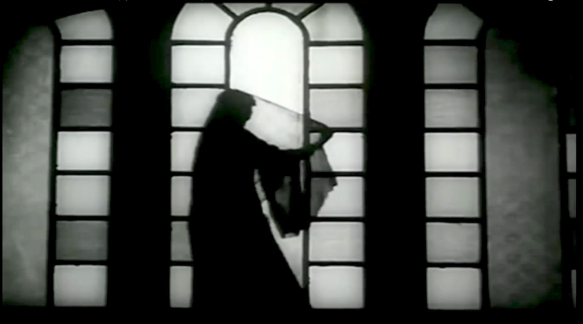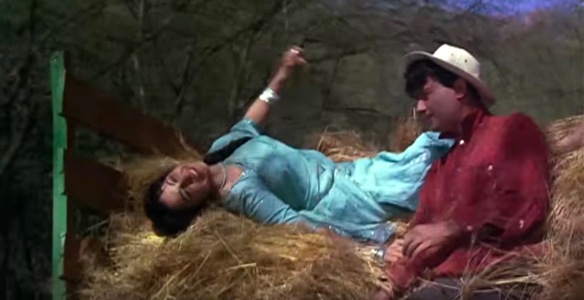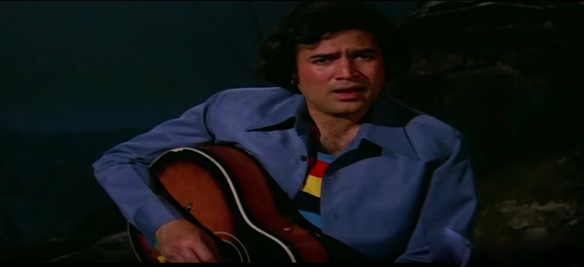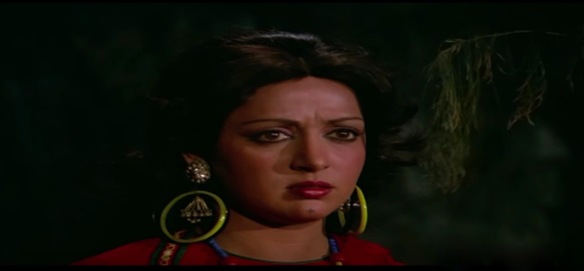
Biswajeet looks dapper in a fedora even as he is haunted by a ghost in Bees Saal Baad (1962).
In honor of Halloween, today we are showcasing one of Bollywood’s spookiest songs “Kahin Deep Jale” from the film Bees Saal Baad (1962). Loosely based on Sir Arthur Conan Doyle’s “The Hound of the Baskervilles”, Bees Saal Baad is a textbook film in the study of Hindi film noir: ghungroo bells echo throughout a long-abandoned mansion. A sad woman’s song fills the night air. Something lurks deep within the marshes, beckoning the viewer closer with every haunting dolly shot through the tall grass. The scene set, Bees Saal Baad weaves an enticing murder mystery that torments us with the thematic imagery of shadows and light as chandeliers sway and silhouettes vanish into the night.
Like a moth drawn to a flame (note the classic Bollywood metaphor that plays a critical role in “Bees Saal Baad”), dapper Londoner Biswajeet cannot resist returning to his ancestral home in Chandangarh and seeking out the truth behind a series of crimes that has plagued the village for 20 years. As the mystery unravels, he falls in love with a local goat shepherdess (played by Waheeda Rehman) who is forbidden from marrying him due to the “curse” marring his family.
There are a number of shady characters who could be the culprit at the dark heart of this whodunnit. Is it the soft-spoken doctor who is next in line to inherit the family fortune? The bug-eyed servant? Or perhaps it is the creepy romantic rival with an oily mustache? None are more despicable than the hero’s own grandfather who had committed the crime of raping a beloved village girl 20 years prior to the film’s main action. Vaguely intrigued? You should be.

“Kahin Deep Jale” opens with a beautifully framed overhead shot of Biswajeet playing the piano, symbolically engulfed by the flames in the chandelier (above). The camera then floats to eye level as he hears the sound of a woman singing in the distance (below).
“Kahin Deep Jale” is the film’s dangerous Siren song broken composed by Hemant Kumar in Ragaa Shivranjani. Other famous songs in this ragaa are Awaaz Deke, Dil Ke Jharoke Mein, and Mere Naina Saawan Bhado, and Shivranjani is a ragaa best performed at midnight (no kidding, right?). We compiled a list of the spookiest songs of classic Bollywood and “Kahin Deep Jale” rightfully made the top three (see which song made #1 here!). Lyricist Shakeel Bayaduni and playback singer Lata Mangeshkar won the Filmfare award in 1962 for their work on “Kahin Deep Jale”!
Director Biren Nag would go on to make Kohra released 2 years later in 1964 (a remake of Hitchcock’s Rebecca), also starring Waheeda Rehman and Biswajeet. Kohra is an even more gorgeously directed film that learned from the mistakes in timing and absent character nuance of Bees Saal Baad. I recommend you binge on all of these films today, we are not judging.

Waheeda Rehman finds herself at the center of a decades old mystery in Bees Saal Baad (1962).
We hope you enjoy the Halloween festivities safely with friends and family! Set the mood by following along with the video here. Fans of the song may be fascinated to hear that parts of the orchestration used in the movie after the chorus that is a full octave lower than the one heard in the recorded version! I find the whole atmosphere becomes even more frightening as a result. Check out our lyrics and English translation to “Kahin Deep Jale” below!
Kahin Deep Jale Kahin Dil Lyrics & Translation:
kahii.N diip jale kahii.N dil…
Somewhere a candle burns, somewhere a heart…
zaraa dekh le aa kar, parvaane
Come closer and take a look, moth
terii kaun sii hai manzil?
Which destiny is yours?
kahii.N diip jale kahii.N dil…
Somewhere a candle burns, somewhere a heart…
meraa giit tere dil kii pukaar hai
My song is the calling of your heart
jahaa.N mai.N huu.N, wahii.N teraa pyaar hai
Wherever I am, your love is there
meraa dil hai terii mehfil
My heart is your only company
zaraa dekh le aa kar, parvaane
Come closer and take a look, moth
terii kaun sii hai manzil?
Which destiny is yours?
kahii.N diip jale kahii.N dil…
Somewhere a candle burns, somewhere a heart…
na mai.N sapnaa huu.N, na koii raaz huu.N
I am neither a dream nor a secret
ek dard bharii aavaaz huu.N
I am a voice filled with sorrow
piiyaa, der na kar, aa mil
Beloved, do not delay, come meet me
zaraa dekh le aa kar, parvaane
Come closer and take a look, moth
terii kaun sii hai manzil?
Which destiny is yours?
kahii.N diip jale kahii.N dil…
Somewhere a candle burns, somewhere a heart…
dushman hai.N hazaaro.N yahaa.N jaan ke
Here there are a thousand enemies of life
zaraa milnaa nazar pehchaan ke
Just make eye contact and recognize them
kaii ruup mei.N hai.N qaatil
Murderers come in many colours
zaraa dekh le aa kar, parvaane
Come closer and take a look, moth
terii kaun sii hai manzil?
Which destiny is yours?
kahii.N diip jale kahii.N dil…
Somewhere a candle burns, somewhere a heart…
Glossary:
diip: candle; jalnaa: to burn; dil: heart; dekhnaa: to look; parwaanaa: moth; kaunsii: which; manzil: destination; giit: song; pukarnaa: to call out; pyaar: love; mehfil: company, gathering; sapnaa: dream; raaz: secret; dard: pain; bharaa: full; awaaz: voice; piyaa: beloved; der karnaa: to delay, to be late; dushman: enemy; hazaar: thousand; jaan: life; nazar milnaa: to make eye contact; pehchaan karnaa: to recognize; ruup: colour; qaatil: murderer

A shadowy figure haunts the mansion and surrounding marshes of Biswajeet’s ancestral home in Bees Saal Baad (1962).
Dying for a little more? The Bengali predecessor of “Kahin Deep Jale” from Jinghasa (1951) can be heard here, also composed by Hemant Kumar. There is a familiar echo of the eerie alaap that later made it to the Hindi version!
While “Bees Saal Baad” does have a handful of things that are scary for the wrong reasons (the bumbling detective hired to investigate the mystery, Waheeda Rehman’s cutesy village girl one-liners clearly written by a man, and the cheesy glove used in the murder scenes), the camerawork is mesmerizing and there is a legitimately satisfying plot twist at the end. Make sure to peruse our translation of Lata Mangeshkar’s creepy “Naina Barse” from that sublime noir film Woh Kaun Thi? (1964) if you dare!
– Mrs. 55













